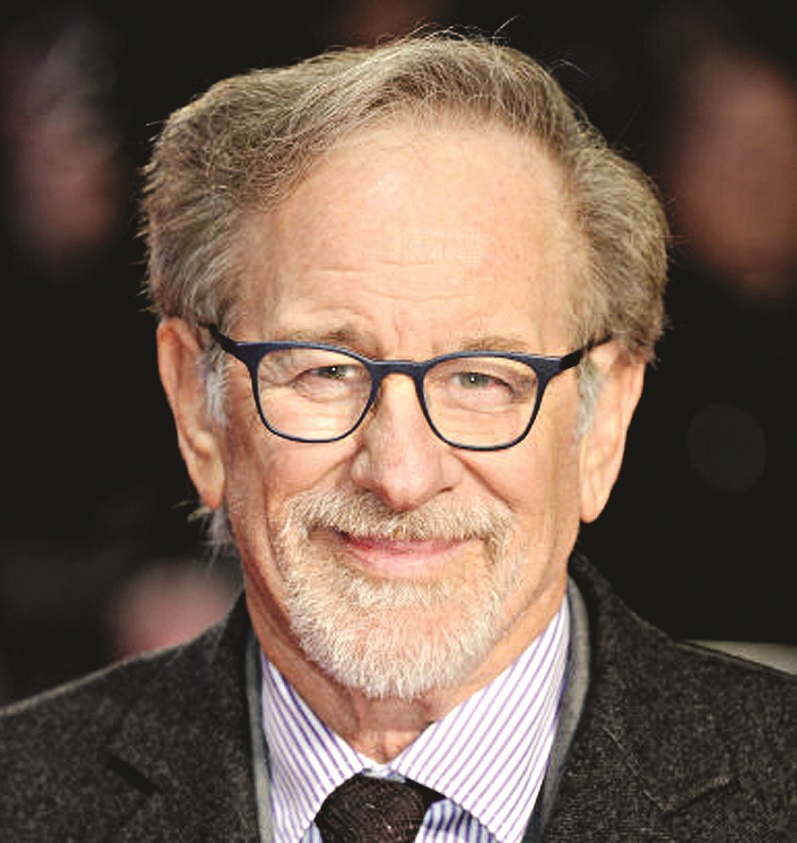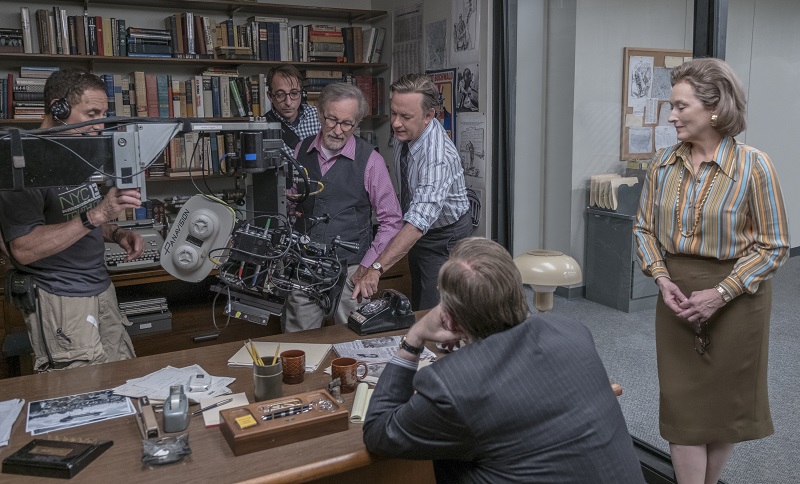Steven Spielberg’s The Post: ‘I’ve been directing 49 years and never had a film come together this quickly’
The American-Jewish film-maker's new thriller, based on the story of the Pentagon Papers, stars Meryl Streep and Tom Hanks
He normally likes to let his ideas “percolate”. But such was the resonance of a story about a president at war with the media that Steven Spielberg was willing to forgo that luxury and get his new film, The Post, wrapped in record time.
His latest thrilling, fact-based drama, released in cinemas on Friday, revolves around the unlikely partnership of Katharine Graham (played by Meryl Streep), the first female publisher of The Washington Post, and its editor Ben Bradlee (Tom Hanks), as they seek to publish the explosive Pentagon Papers.
The top-secret document – first leaked to the New York Times in 1971 by Daniel Ellsberg, a military analyst-turned-whistleblower – damningly exposed how four US presidents over 30 years had repeatedly misled the public about US involvement in Vietnam, and proved the conflict was in fact “unwinnable”.
Get The Jewish News Daily Edition by email and never miss our top stories Free Sign Up
Even as the government was said to be pursuing peace, the military and CIA covertly expanded the war, costing the lives of 58,220 US service members and the loss of more than a million lives.
When the New York Times was threatened in the courts for publishing these damning revelations, The Washington Post took up the mantle – despite the great personal risk to both Graham and Bradlee.
Speaking ahead of the film’s release at a press conference in London this week, alongside Streep and Hanks, Spielberg revealed how he felt compelled to make The Post, despite being in intensive preparation for his forthcoming sci-fi thriller, Ready Player One, and only having a mere 11 weeks to devote to the project.
The 71-year-old American-Jewish director says: “A lot of my movies take a long time to develop. I buy books and scripts, years go by and I go to other movies instead. It percolates, it comes back into my life. I finally get around to making them, but in my entire span of 49 years professionally directing I never had a film come together this quickly.”
Aside from the obvious parallels between government attempts to silence journalists in 1971 and the more recent criticism hurled by the Trump administration against what it calls the “fake news media”, Spielberg was also won over by the personal story of Graham – the daughter of a Jewish financier-turned-publisher – who was thrust into a world dominated by men.

The prolific film-maker explains he was taken with “Katharine Graham’s story, her evolution as a real person of real potential power, who did not really have the facility to exercise that power, because she hadn’t quite found her centre of gravity. She hadn’t found how to use her own voice.”
Streep, who last year marked 40 years working in the film industry, says she immediately embraced the role of this pioneering woman.
The 68-year-old star explains: “What I thought was interesting about the screenplay was that it fell to a woman to hold the line for press freedom at a time when women were excluded from any kind of leadership role in the press.
“There were no women reporters, that was very unusual.
“I look around this room and I see many, many women. You would not be here in 1971. So it was a different world.”
Graham was a trailblazer in many ways, not only as the Washington Post’s first female publisher, but also as the first female CEO of a Fortune 500 company.
While she may have lacked confidence after first assuming the reigns of her family-owned paper, The Post shows how she finally became a woman of enormous courage in the face of the Pentagon Papers.
Following their triumph in bringing the government’s Vietnam deception to light, The Washington Post went on to expose Richard Nixon again through Karl Bernstein and Bob Woodward’s investigation into Watergate, eventually leading to the president’s resignation.

“Without the courage of Bradlee and Graham, there would not have been enough cajones, combined with women’s intuition, to allow the Washington Post to go after Richard Nixon the way it did,” adds Spielberg.
While today’s world looks very different to that of 1971, the panel acknowledged there was still “disparity” between men and women, including within Hollywood.
Spielberg acknowledges there are not enough women directors, but is optimistic this will change and there are now “many, many women directors telling significant stories and making a real place for themselves.”
As for the recent sexual harassment allegations that have rocked Hollywood, Streep believes a “global, seismic change” is taking place, following the #Me Too and Time’s Up movements.
“As a movement it’s pretty interesting to be involved. It is like a hive of bees, there are more and more coming in. Everybody is making honey, everybody is doing the good work.
“It is a moving thing and that’s good because it needs to fly, it needs to alight on many different industries, many different enterprises … government, military, the church.
“The inequities and the imbalance of power isn’t just in Hollywood.
“Most heartening is it doesn’t feel like a one off, it won’t go away. We won’t go backwards.”
The Post (12A) is released in cinemas on Friday

Thank you for helping to make Jewish News the leading source of news and opinion for the UK Jewish community. Today we're asking for your invaluable help to continue putting our community first in everything we do.
For as little as £5 a month you can help sustain the vital work we do in celebrating and standing up for Jewish life in Britain.
Jewish News holds our community together and keeps us connected. Like a synagogue, it’s where people turn to feel part of something bigger. It also proudly shows the rest of Britain the vibrancy and rich culture of modern Jewish life.
You can make a quick and easy one-off or monthly contribution of £5, £10, £20 or any other sum you’re comfortable with.
100% of your donation will help us continue celebrating our community, in all its dynamic diversity...
Engaging
Being a community platform means so much more than producing a newspaper and website. One of our proudest roles is media partnering with our invaluable charities to amplify the outstanding work they do to help us all.
Celebrating
There’s no shortage of oys in the world but Jewish News takes every opportunity to celebrate the joys too, through projects like Night of Heroes, 40 Under 40 and other compelling countdowns that make the community kvell with pride.
Pioneering
In the first collaboration between media outlets from different faiths, Jewish News worked with British Muslim TV and Church Times to produce a list of young activists leading the way on interfaith understanding.
Campaigning
Royal Mail issued a stamp honouring Holocaust hero Sir Nicholas Winton after a Jewish News campaign attracted more than 100,000 backers. Jewish Newsalso produces special editions of the paper highlighting pressing issues including mental health and Holocaust remembrance.
Easy access
In an age when news is readily accessible, Jewish News provides high-quality content free online and offline, removing any financial barriers to connecting people.
Voice of our community to wider society
The Jewish News team regularly appears on TV, radio and on the pages of the national press to comment on stories about the Jewish community. Easy access to the paper on the streets of London also means Jewish News provides an invaluable window into the community for the country at large.
We hope you agree all this is worth preserving.
-
By Laurent Vaughan - Senior Associate (Bishop & Sewell Solicitors)
-
By Laurent Vaughan - Senior Associate (Bishop & Sewell Solicitors)
-
By Laurent Vaughan - Senior Associate (Bishop & Sewell Solicitors)
-
By Laurent Vaughan - Senior Associate (Bishop & Sewell Solicitors)





















